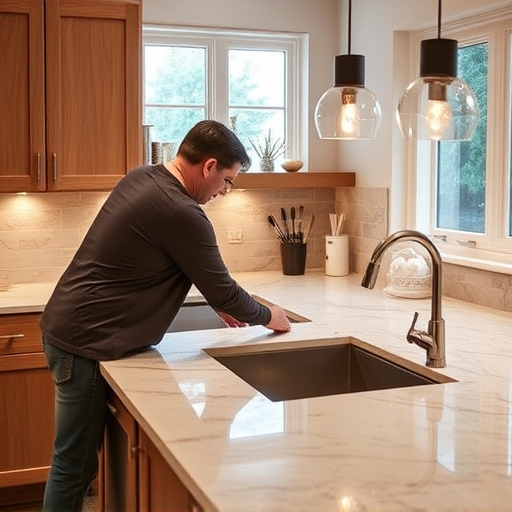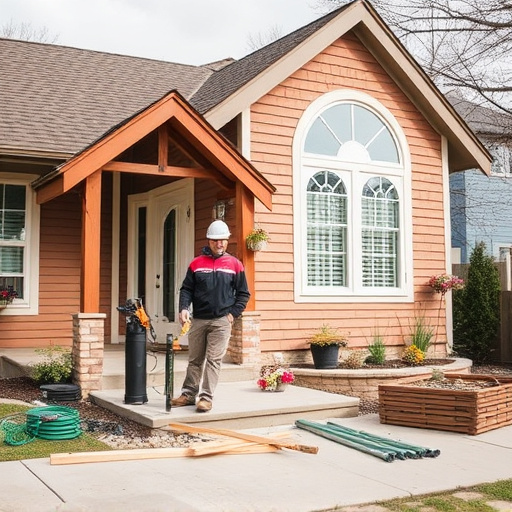Sustainable tile flooring is an eco-conscious choice for home renovations, utilizing recycled materials like ceramic, glass, or plastic bottles and efficient manufacturing processes to minimize resource depletion, energy consumption, and waste. With its versatile design, durability, and reduced environmental impact compared to traditional flooring, tile is a popular option for those seeking both style and sustainability, contributing to a greener global landscape.
“Discover the transformative power of sustainable tile flooring—a eco-conscious choice with profound environmental benefits. This article explores how this innovative flooring option reduces your carbon footprint through its eco-friendly materials and streamlined manufacturing processes, outperforming traditional counterparts in waste minimization and recycling potential.
From enhanced energy efficiency through superior insulation to unparalleled durability and longevity, sustainable tile flooring is a smart investment for both homes and businesses, contributing to green building certifications and saving you money over time.”
- Reducing Environmental Impact: The Eco-Friendly Nature of Sustainable Tile Flooring
- – Exploring the materials and manufacturing processes that contribute to its ecological benefits
- – Discussing how it minimizes waste and promotes recycling compared to traditional flooring options
Reducing Environmental Impact: The Eco-Friendly Nature of Sustainable Tile Flooring

Sustainable tile flooring represents a significant step forward in reducing the environmental impact of construction and renovation projects. Unlike traditional flooring options that often involve harmful manufacturing processes and non-renewable resources, sustainable tiles are crafted with eco-conscious practices. These tiles typically utilize recycled materials, such as reclaimed ceramic or porcelain, minimizing the demand for new resources and diverting waste from landfills.
Furthermore, the production methods employed in sustainable tile manufacturing significantly lower energy consumption and greenhouse gas emissions. Customized home renovations and kitchen remodel projects that opt for these eco-friendly flooring solutions contribute to a greener landscape, both locally and globally. Whether for residential renovations or other applications, sustainable tile flooring offers an attractive option for those seeking to minimize their environmental footprint while enjoying the aesthetic appeal and durability of high-quality tiles.
– Exploring the materials and manufacturing processes that contribute to its ecological benefits

Tile flooring offers a compelling blend of aesthetics and environmental sustainability. Its ecological benefits are deeply rooted in the materials used and manufacturing processes employed. Many modern tile options are made from recycled materials, such as reclaimed ceramic, glass, or even plastic bottles, significantly reducing the demand for new resources and minimizing waste. Additionally, the production methods have evolved to become more energy-efficient, with manufacturers adopting advanced technologies that lower carbon footprints.
This shift towards sustainability is further enhanced by the versatility of tile flooring, making it a popular choice not just for indoor spaces but also for exterior painting projects. In the realm of customized home renovations, tile stands out as a versatile and durable option, allowing homeowners to create unique designs while contributing to a greener living environment. The longevity of tile flooring means less frequent replacements, reducing the overall environmental impact associated with manufacturing and disposal.
– Discussing how it minimizes waste and promotes recycling compared to traditional flooring options

Tile flooring offers a sustainable solution for homeowners looking to minimize their environmental impact during customized home renovations or a kitchen remodel. Unlike traditional flooring options that often contribute to significant waste and resource depletion, tile promotes recycling and responsible disposal. The production of tile typically generates less waste compared to other materials, as it involves fewer processing steps. Moreover, many tile manufacturers embrace eco-friendly practices, incorporating recycled content into their products and ensuring efficient use of resources.
When it comes time for a home renovation, choosing tile flooring can contribute to a greener project overall. Because tiles are durable and long-lasting, they reduce the need for frequent replacements, lessening the demand for new materials and minimizing construction waste. Additionally, the versatility of tile allows for creative design options without excessive resource consumption, making it an excellent choice for those seeking both style and sustainability in their home renovation.
Sustainable tile flooring isn’t just a stylish choice; it’s an environmentally conscious decision with tangible benefits. By opting for eco-friendly tiles, we can reduce our carbon footprint, minimize waste, and promote recycling in the flooring industry. This shift towards sustainable practices is crucial in preserving our planet’s resources for future generations, ensuring a greener and more vibrant world. So, why not take the step towards a more sustainable home? Tile flooring that’s kind to the environment is within reach, offering both style and ecological responsibility.














